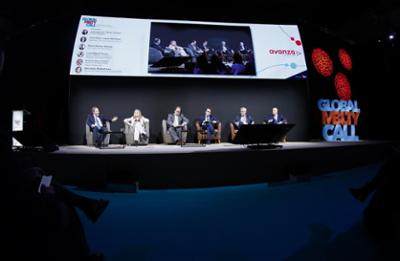

PENIEC and future options for the mobility fleet under discussion at Global Mobility Call
This event, organised by IFEMA MADRID and Smobhub, hosted this round table discussion on the National Integrated Energy and Climate Plan (PNIEC) 2021-2030 in Spain.
The round table ‘Towards Sustainable Mobility: Challenges and Opportunities of the PNIEC’ sponsored by Avanza, gathered authoritative voices of the mobility scene in our country such as José Ignacio Cases, president of Novadays; Mercedes Ballesteros, director of the Department of Energy of CIEMAT; José Mª López Martínez, professor at the UPM; Mario Muñoz, deputy minister of Mobility of the Junta de Andalucía; Luis Miguel Torres, general director of Mobility of the Junta de Andalucía; Luis Miguel Torres, general director of Mobility of the Junta de Andalucía; Mario Muñoz, Deputy Minister of Mobility of the Junta de Andalucía; Luis Miguel Torres, Director General of Transport and Mobility of the Community of Madrid; and Antonio García Pastor, Director of Strategic Mobility Projects of Mobility ADO, who addressed the challenges and opportunities of sustainable transport in Spain.
The analysis focused on the strategies needed to overcome the main challenges and obstacles, highlighting the keys to progress towards a modern and sustainable public transport system. In this context, the professor at the Polytechnic University of Madrid (UPM) and former commissioner of the Electric and Connected Vehicle (EV) Perte stated that the goal of having 5.5 million electric vehicles in Spain by 2030 will not be achieved. He also ruled out that this objective of the National Integrated Energy and Climate Plan 2021-2030 will be met, stating that synthetic fuels should also be supported, ‘because that decarbonises’.
For his part, the president of the consultancy Novadays, José Ignacio Cases, explained that, in order to make the modal shift in transport in Spain, investments of more than 14 billion euros over 15 years between the public and private sectors would be necessary to electrify the existing fleet and increase it by 40%.
For her part, the director of the Energy Department of the Centre for Energy, Environmental and Technological Research (Ciemat), Mercedes Ballesteros, said that it will take a long time to reduce the very high percentage - 98% - of oil in road transport. She added that, to achieve the savings of 32 million tonnes of CO2 or equivalent in 2030 as envisaged by the PNIEC, it would be necessary to reduce journeys and trips, to have more compact cities that reduce needs for transport and to develop alternative fuels, above all for sectors that will be very difficult to electrify, such as air and maritime transport.
The Director General of Transport and Mobility of the Community of Madrid, Luis Miguel Torres, pointed out that, in his region, in order to achieve the PNIEC objectives, 1,300 buses would have to be renewed every year, which is a very significant investment, especially for third parties who are awarded transport concessions; and he stated that the objectives will only be achieved with funding.
Mario Muñoz-Atanet, Deputy Minister of Mobility of the Andalusian Regional Government, indicated that, to achieve modal shift, public transport has to be efficient and reliable, provide very good information on frequencies and waiting times by means of devices, and have good fares.
The Director of Operations of the Avanza road passenger transport group, Antonio García Pastor, said that in 2024 they will have around 200 electric vehicles in operation in Spain and the objective is to have around 430 in 2026.
*Content provided by Agencia EFE





